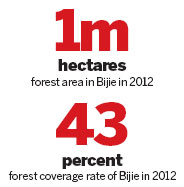
When 50-year-old Li Jibao first took the job as a ranger, he didn't realize it meant protecting the environment of a much larger area than just his home village.
Li lives in Xinping village, located in Bijie city of southwest China's mountainous and wooded Guizhou province.
"Although cutting is strictly prohibited, it still occurs occasionally," Li said. Deforestation has caused serious soil erosion and rock desertification in the area.
In 2008, Li volunteered to serve as the only ranger in his village. Guarding the forests has been his job ever since.
"During the dry season, I have to live in the mountain to ensure the safety of the forests," said Li, adding that patrolling the forests has not always been an easy task.
"Now the people in the village have realized the importance of ecological protection, and forestation has become a common objective for us," he said.
|
Terry Gou (second from left), founder of Foxconn, speaks at the Eco Forum Global Annual Conference Guiyang 2013. Foxconn is planning a manufacturing base in Guizhou. Zhu Xingxin / China Daily |
However, Li and his fellow villagers were surprised to learn that their hard work has affected more than their own forest.
As the upper reaches of the Pearl River Basin, Guizhou plays an important role in the ecological environment of the entire region.
"Bijie is located in the upper reaches of the Pearl River. To ensure the ecological security of the middle and lower reaches, we must insist that economic development and short-term growth not come at the expense of the environment," said Chen Changxu, mayor of the city.
Chen said the unique geological features of the ecosystem in Bijie have caused the soil erosion and land desertification in the past years. He said addressing the environmental issue will also improve the quality of life for local people.
In Bijie's Zhejue county, home to an important tributary of the Pearl River, the forest coverage rate was only 40 percent in 2002, which was far from being able to effectively protect the environment at the time. But after a little more than a decade, the rate has grown to 56.4 percent.

In addition to planting trees, the local government also encourages locals to grow herbs that are materials for traditional Chinese medicines, said Lan Honggui, Party chief of Zhejue.
Now locals call the forest a "green bank", because they can benefit from it. In spring, they can get more than 100 yuan every day just by picking up pine needles, which is used to cover the soil to help the herbs grow.
From 1988 to 2012, the forest area in Bijie increased from some 400,000 hectares to more than 1 million hectares, with the forest coverage rate increasing from around 15 percent to 43 percent, according to Chen.
According to the document issued by the State Council in 2012 to further promote Guizhou's development, an upstream ecological barrier will be established in the province for the Yangtze River and the Pearl River.
zhaokai@chinadaily.com.cn
